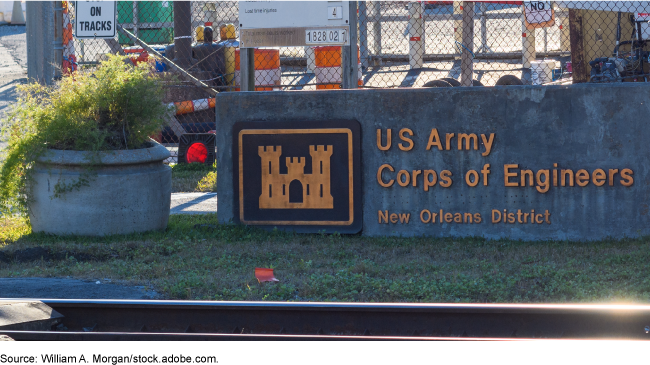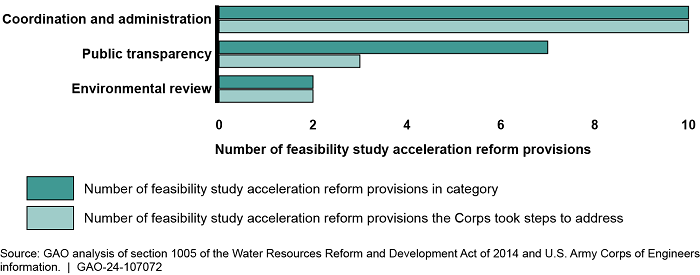Army Corps of Engineers: Additional Steps Needed to Implement Acceleration Reforms
Fast Facts
The Army Corps of Engineers conducts feasibility studies to determine whether and how to do water resources projects—e.g., manage flood risks. These studies are to be completed within 3 years, but have often been delayed.
A 2014 law set forth 19 reforms to speed up these studies. This Q&A reports that the Corps has taken steps to address 15 of these reforms, but not the remaining 4—which generally require the Corps to make information on the reforms publicly available. The Corps said it doesn't have enough funds to implement some of these reforms but hasn't communicated its needs to Congress.
We recommended, among other things, that it do so.

Highlights
What GAO Found
The U.S. Army Corps of Engineers (Corps) conducts feasibility studies as a key initial step in determining whether and how to undertake a project to develop water resources—for example, to improve navigation channels or manage flood risks. The full feasibility study process is generally to be completed within 3 years, but the Corps has historically experienced delays in doing so.
The Water Resources Reform and Development Act of 2014 contains 19 provisions to accelerate the completion of feasibility studies. GAO grouped these provisions into three general categories: coordination and administration, environmental review, and public transparency. The Corps has taken steps to address 15 of the provisions, including all of the 12 provisions in two categories—coordination and administration, and environmental review. However, the Corps has not taken steps to address four of the seven provisions in the public transparency category (see figure).
Number of the Water Resources Reform and Development Act of 2014 Feasibility Study Acceleration Reform Provisions, per Category, the Corps Has Taken Steps to Address as of May 2024

Corps officials cited a lack of funding as one reason for not implementing some of these provisions, stating there have been no funds appropriated specifically for the implementation of the provisions since the act's inception. However, the Corps has not communicated its identified funding needs to Congress. Until the Corps does so, Congress may not understand the Corps' resource needs and the Corps may remain unable to obtain or publish some information that it is required to make publicly available.
Officials that GAO interviewed from agencies that partner with the Corps on water resources development projects stated that the Corps has continued to collaborate with them to implement the acceleration provisions. However, they cited some negative effects of the Corps' implementation of the provisions. For example, officials from the Fish and Wildlife Service and National Marine Fisheries Service both stated that they faced increased time pressures in contributing to and completing feasibility studies.
The Corps has not evaluated the impacts of accelerating feasibility studies. Without doing so, the Corps cannot identify negative impacts and take actions to address or mitigate them. GAO recommended in July 2019 that the Corps develop a plan to comprehensively evaluate the impacts of accelerating feasibility studies, and the Corps agreed with this recommendation. However, as of May 2024, the Corps has not yet implemented the recommendation. Such a plan would improve the Corps' ability to evaluate the effects on project delivery, compliance with environmental laws, and the projects' environmental impacts.
Why GAO Did This Study
Historically, the Corps' feasibility studies for water resources development projects have taken years, or even decades, to move from conception to completion. In section 1005 of the Water Resources Reform and Development Act of 2014, Congress set forth provisions to accelerate these studies and improve public transparency of those studies, among other things. The act also includes a provision for GAO to assess the Corps' reforms in response to these provisions and report to Congress 5 and 10 years after the legislation's enactment.
In July 2019, GAO reported on the Corps' initial steps toward these reforms. This report is the follow-up to the 2019 report. It examines steps the Corps has taken since 2019 to implement the feasibility study acceleration reform provisions and assess their impact, and it describes impacts identified by Corps partners. GAO reviewed the statutory provisions, as well as Corps policy and guidance documents. GAO also interviewed officials from the Corps and two partner agencies. GAO compared the information obtained to the statutory requirements of each provision.
Recommendations
GAO is making four recommendations to help ensure the Corps further addresses the provisions related to public transparency, including providing Congress with information about its identified funding needs related to the provisions. In addition, GAO maintains that the Corps should develop a plan to conduct a comprehensive evaluation of the impacts of its actions to accelerate feasibility studies, as GAO previously recommended.
Recommendations for Executive Action
| Agency Affected | Recommendation | Status |
|---|---|---|
| Corps of Engineers | The Assistant Secretary of the Army for Civil Works should ensure that the Chief of Engineers and the Commanding General of the U.S. Army Corps of Engineers prepare and submit the annual lists of feasibility studies that do not have adequate funding to make substantial progress toward the completion of studies to the Office of Management and Budget, or, if it is not feasible, seek repeal of the statutory requirement to do so. (Recommendation 1) |
DOD concurred with this recommendation. On September 12, 2024, the Army Corps of Engineers provided GAO with a Corrective Action Plan outlining future actions to address the recommendation. According to this plan, the Corps anticipates completing the necessary actions, including comparing the appropriations for ongoing feasibility studies to the study's scope and schedule, by December 31, 2025. We will continue to monitor the Corps' progress in implementing this recommendation.
|
| Corps of Engineers | The Assistant Secretary of the Army for Civil Works should ensure that the Chief of Engineers and the Commanding General of the U.S. Army Corps of Engineers provide the Corps' cost estimate for developing and maintaining the electronic database to Congress. (Recommendation 2) |
DOD concurred with this recommendation. On September 12, 2024, the Army Corps of Engineers provided GAO with a Corrective Action Plan outlining future actions to address the recommendation. According to this plan, the Corps anticipates completing the necessary actions, including developing scope and cost estimates for National Environmental Policy Act transparency reporting to incorporate into USACE Civil Works budget requests, by February 28, 2026.
|
| Corps of Engineers | The Assistant Secretary of the Army for Civil Works should ensure that the Chief of Engineers and the Commanding General of the U.S. Army Corps of Engineers solicit requests from other federal agencies and project sponsors for new categorical exclusions. (Recommendation 3) |
DOD concurred with this recommendation. On September 12, 2024, the Army Corps of Engineers provided GAO with a Corrective Action Plan outlining future actions to address the recommendation. According to this plan, the Corps anticipates completing the necessary actions, including drafting and publishing a Federal Register Notice with proposed National Environmental Policy Act guidance updates, by December 31, 2025.
|
| Corps of Engineers | The Assistant Secretary of the Army for Civil Works should ensure that the Chief of Engineers and the Commanding General of the U.S. Army Corps of Engineers establish a performance measurement program that includes clearly defined short- and long-term performance goals to monitor and evaluate progress in improving and expediting the planning and environmental review process. (Recommendation 4) |
DOD concurred with this recommendation. On September 12, 2024, the Army Corps of Engineers provided GAO with a Corrective Action Plan outlining future actions to address the recommendation. According to this plan, the Corps anticipates completing the necessary actions, including developing scope and cost estimates for a performance measurement program to incorporate into USACE Civil Works budget requests, by February 28, 2026.
|
